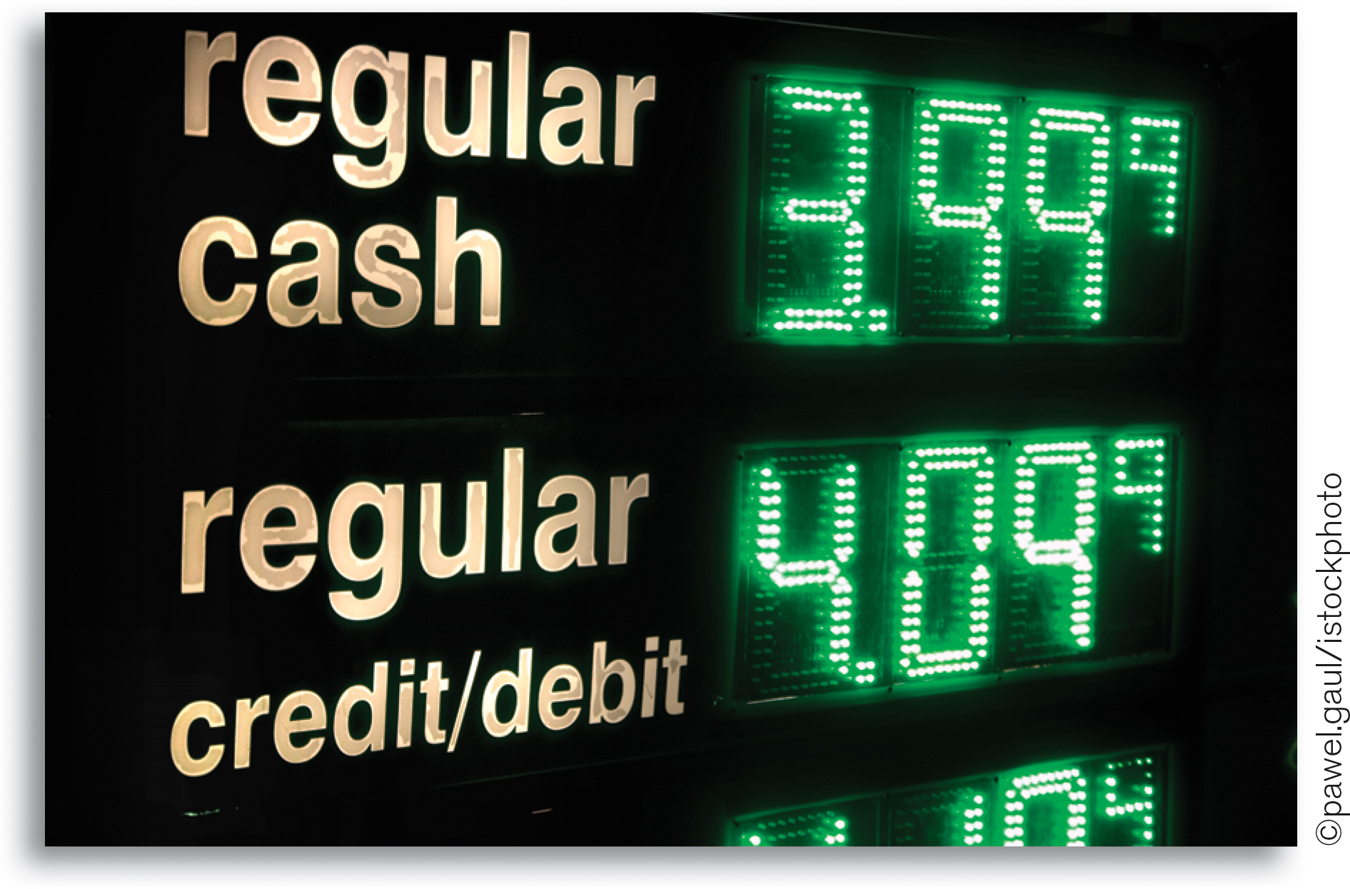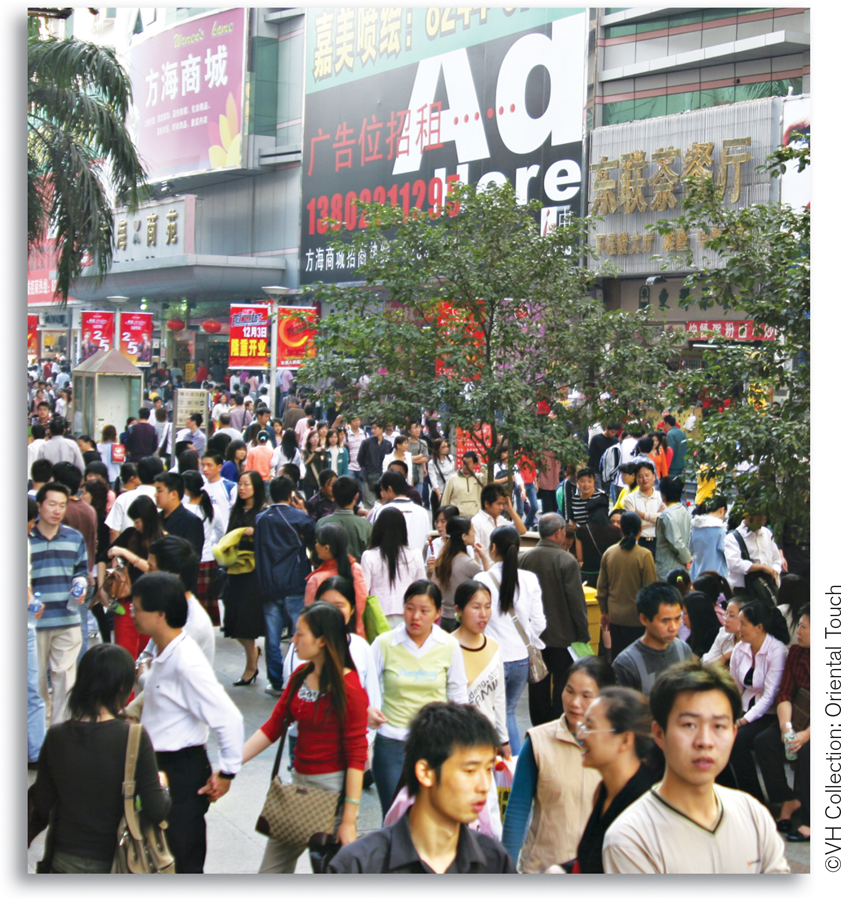A Market Economy
As we learned earlier, in a market economy decisions about production and consumption are made via markets. In fact, the economy as a whole is made up of many interrelated markets. Up until now, to learn how markets work, we’ve been examining a single market—
We know that an efficient market equilibrium maximizes total surplus—
When each and every market in the economy maximizes total surplus, then the economy as a whole is efficient. This is a very important result: just as it is impossible to make someone better off without making other people worse off in a single market when it is efficient, the same is true when each and every market in that economy is efficient. However, it is important to realize that this is a theoretical result: it is virtually impossible to find an economy in which every market is efficient.
For now, let’s examine why markets and market economies typically work so well. Once we understand why, we can then briefly address why markets sometimes get it wrong.
Why Markets Typically Work So Well
Economists have written volumes about why markets are an effective way to organize an economy. In the end, well-
Property rights are the rights of owners of valuable items, whether resources or goods, to dispose of those items as they choose.
By property rights we mean a system in which valuable items in the economy have specific owners who can dispose of them as they choose. In a system of property rights, by purchasing a good you receive “ownership rights”: the right to use and dispose of the good as you see fit. Property rights are what make the mutually beneficial transactions in the used-
To see why property rights are crucial, imagine that students do not have full property rights in their textbooks and are prohibited from reselling them when the semester ends. This restriction on property rights would prevent many mutually beneficial transactions. Some students would be stuck with textbooks they will never reread when they would be much happier receiving some cash instead. Other students would be forced to pay full price for brand-
An economic signal is any piece of information that helps people make better economic decisions.
Once a system of well-
But prices are far and away the most important signals in a market economy, because they convey essential information about other people’s costs and their willingness to pay. If the equilibrium price of used books is $30, this in effect tells everyone both that there are consumers willing to pay $30 and up and that there are potential sellers with a cost of $30 or less. The signal given by the market price ensures that total surplus is maximized by telling people whether to buy books, sell books, or do nothing at all.
Each potential seller with a cost of $30 or less learns from the market price that it’s a good idea to sell her book; if she has a higher cost, it’s a good idea to keep it. Likewise, each consumer willing to pay $30 or more learns from the market price that it’s a good idea to buy a book; if he is unwilling to pay $30, then it’s a good idea not to buy a book.

This example shows that the market price “signals” to consumers with a willingness to pay equal to or more than the market price that they should buy the good, just as it signals to producers with a cost equal to or less than the market price that they should sell the good. And since, in equilibrium, the quantity demanded equals the quantity supplied, all willing consumers will find willing sellers.
Prices can sometimes fail as economic signals. Sometimes a price is not an accurate indicator of how desirable a good is. When there is uncertainty about the quality of a good, price alone may not be an accurate indicator of the value of the good. For example, you can’t infer from the price alone whether a used car is good or a “lemon.” In fact, a well-
A Few Words of Caution
As we’ve seen, markets are an amazingly effective way to organize economic activity. But as we’ve noted, markets can sometimes get it wrong. We first learned about this in Chapter 1 in our fifth principle of interaction: When markets don’t achieve efficiency, government intervention can improve society’s welfare.
A market or an economy is inefficient if there are missed opportunities: some people could be made better off without making other people worse off.
When markets are inefficient, there are missed opportunities—
Market failure occurs when a market fails to be efficient.
Markets can be rendered inefficient for a number of reasons. Two of the most important are a lack of property rights and inaccuracy of prices as economic signals. When a market is inefficient, we have what is known as market failure. We will examine various types of market failure in later chapters. For now, let’s review the three main ways in which markets sometimes fall short of efficiency.
Markets can fail when, in an attempt to capture more surplus, one party prevents mutually beneficial trades from occurring. This situation arises, for instance, when a market contains only a single seller of a good, known as a monopolist. In this case, the assumption we have relied on in supply and demand analysis—
that no individual buyer or seller can have a noticeable effect on the market price— is no longer valid; the monopolist can determine the market price. As we’ll see in Chapter 13, this gives rise to inefficiency as a monopolist manipulates the market price in order to increase profits, thereby preventing mutually beneficial trades from occurring. Actions of individuals sometimes have side effects on the welfare of others that markets don’t take into account. In economics, these side effects are known as externalities, and the best-
known example is pollution. We can think of the problem of pollution as a problem of incomplete property rights; for example, existing property rights don’t guarantee a right to ownership of clean air. We’ll see in Chapter 16 that pollution and other externalities also give rise to inefficiency. Markets for some goods fail because these goods, by their very nature, are unsuited for efficient management by markets. In Chapter 20, we will analyze goods that fall into this category because of problems of private information—
information about a good that some people possess but others don’t. For example, the seller of a used car that is a “lemon” may have information that is unknown to potential buyers.
In Chapter 17, we will encounter other types of goods that fall into the category of being unsuited for efficient management by markets—public goods, common resources, and artificially scarce goods. Markets for these goods fail because of problems in limiting people’s access to and consumption of the good; examples are fish in the sea and trees in the Amazonian rain forest. In these instances, markets generally fail due to incomplete property rights.
But even with these limitations, it’s remarkable how well markets work at maximizing the gains from trade.
!worldview! ECONOMICS in Action: A Great Leap—Backward
A Great Leap—

Economies in which a central planner, rather than markets, makes consumption and production decisions are known as planned economies. Russia (formerly part of the U.S.S.R.), many Eastern European countries, and several Southeast Asian countries once had planned economies, and countries such as India and Brazil once had significant parts of their economies under central planning. China still does today.
Planned economies are notorious for their inefficiency, and what is probably the most compelling example of that is the so-
Unfortunately, the plan backfired. Diverting farmers from their usual work led to a sharp fall in food production. Meanwhile, because raw materials for steel, such as coal and iron ore, were sent to ill-
Because China was a very poor country to start with, the results were catastrophic. The famine that followed is estimated to have reduced China’s population by as much as 30 million.
China has recently moved closer to a free-
Quick Review
In a market economy, markets are interrelated. When each and every market in an economy is efficient, the economy as a whole is efficient. But in the real world, some markets in a market economy will almost certainly fail to be efficient.
A system of property rights and the operation of prices as economic signals are two key factors that enable a market to be efficient. But under conditions in which property rights are incomplete or prices give inaccurate economic signals, markets can fail.
Under certain conditions, market failure occurs and the market is inefficient: gains from trade are unrealized. The three principal ways in which markets fail are the prevention of mutually beneficial transactions caused by one party’s attempt to capture more surplus, side effects that aren’t properly accounted for, and problems in the nature of the goods themselves.
4-4
Question 4.6
In some states that are rich in natural resources, such as oil, the law separates the right to above-
ground use of the land from the right to drill below ground (called “mineral rights”). Someone who owns both the above- ground rights and the mineral rights can sell the two rights separately. Explain how this division of the property rights enhances efficiency compared to a situation in which the two rights must always be sold together. When these rights are separated, someone who owns both the above-ground and the mineral rights can sell each of these separately in the market for above-ground rights and the market for mineral rights. And each of these markets will achieve efficiency: If the market price for above-ground rights is higher than the seller’s cost, the seller will sell that right and total surplus increases. If the market price for mineral rights is higher than the seller’s cost, the seller will sell that right and total surplus increases. If the two rights, however, cannot be sold separately, a seller can only sell both rights or none at all. Imagine a situation in which the seller values the mineral right highly (that is, has a high cost of selling it) but values the above-ground right much less. If the two rights are separate, the owner may sell the above-ground right (increasing total surplus) but not the mineral right. If, however, the two rights cannot be sold separately, and the owner values the mineral right sufficiently highly, she may not sell either of the two rights. In this case, surplus could have been created through the sale of the above-ground right but goes unrealized because the two rights could not be sold separately.Question 4.7
Suppose that in the market for used textbooks the equilibrium price is $30, but it is mistakenly announced that the equilibrium price is $300. How does this affect the efficiency of the market? Be specific.
There will be many sellers willing to sell their books but only a few buyers who want to buy books at that price. As a result, only a few transactions will actually occur, and many transactions that would have been mutually beneficial will not take place. This, of course, is inefficient.Question 4.8
What is wrong with the following statement? “Markets are always the best way to organize economic activity. Any policies that interfere with markets reduce society’s welfare.”
Markets, alas, do not always lead to efficiency. When there is market failure, the market outcome may be inefficient. This can occur for three main reasons. Markets can fail when, in an attempt to capture more surplus, one party—a monopolist, for instance— prevents mutually beneficial trades from occurring. Markets can also fail when one individual’s actions have side effects—externalities—on the welfare of others. Finally, markets can fail when the goods themselves—such as goods about which some relevant information is private—are unsuited for efficient management by markets. And when markets don’t achieve efficiency, government intervention can improve society’s welfare.
Solutions appear at back of book.
StubHub Shows Up The Boss
Back in 1965, long before Ticketmaster, StubHub, and TicketsNow, legendary rock music promoter Bill Graham noticed that mass parties erupted wherever local rock groups played. Graham realized that fans would pay for the experience of the concert, in addition to paying for a recording of the music. He went on to create the business of rock concert promoting—

Wanting to maintain the aura of the 1960s that made rock concerts accessible to all their fans, many top bands choose to price their tickets below the market equilibrium level. For example, in 2012 Bruce Springsteen sold tickets at his concerts in New Jersey (his home state and home to his most ardent fans) for between $68 and $98. Tickets for Springsteen concerts could have sold for far more: economists Alan Krueger and Marie Connolly analyzed a 2002 Springsteen concert for which every ticket sold for $75 and concluded that The Boss forfeited about $4 million by not charging the market price, about $280. He likely forfeited much more surplus in 2012 as ticket prices soared to over $6,000 online at various resale sites.
So what was The Boss thinking? Cheap tickets can ensure that a concert sells out, making it a better experience for both band and audience. But it is believed that other factors are at work—
But the rise of the internet has complicated matters. Now, rather than queue for tickets at the venue, fans buy tickets online, either from a direct seller like Ticketmaster (which obtains tickets directly from the concert producer) or a reseller like StubHub or TicketsNow. Resellers (otherwise known as scalpers) can—
This practice has infuriated fans as well as bands. But resellers have cast the issue as one of the freedom to dispose of one’s ticket as one chooses. Since ticket reselling comes under the purview of state laws, the two sides have been lobbying furiously to get an advantage. And as of 2014, there is a hodgepodge of state laws governing ticket reselling. Many states, such as Alaska, impose no restrictions on reselling. In contrast, Michigan forbids ticket reselling without permission from the event’s sponsor. In general, the trend at the state level has been to allow ticket reselling as long as consumers are adequately protected against fraud.
QUESTIONS FOR THOUGHT
Question 4.9
Use the concepts of consumer surplus and producer surplus to analyze the exchange between The Boss and his fans. Draw a diagram to illustrate.
Question 4.10
Explain how the rise of the internet has disrupted this exchange.
Explain how the rise of the internet has disrupted this exchange.Question 4.11
Draw a diagram to show the effect of resellers on the allocation of consumer surplus and producer surplus in the market for concert tickets. What are the implications of the internet for all such exchanges?